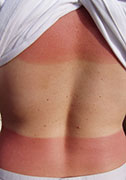- Could Your Grocery Store Meat Be Causing Recurring UTIs?
- Are You Making This Expensive Thermostat Error This Winter?
- Recognizing the Signs of Hypothyroidism
- 10 Strategies to Overcome Insomnia
- Could Artificial Sweeteners Be Aging the Brain Faster?
- Techniques for Soothing Your Nervous System
- Does the Water in Your House Smell Funny? Here’s Why
- Can a Daily Dose of Apple Cider Vinegar Actually Aid Weight Loss?
- 6 Health Beverages That Can Actually Spike Your Blood Sugar
- Treatment Options for Social Anxiety Disorder
Sun’s Damage Lingers Long After Dark


Skin damage caused by ultraviolet (UV) radiation continues long after you get out of the sun, even in the dark, a new study says.
Researchers explain that UV light from the sun or tanning beds can damage DNA in melanocytes. Melanocytes are cells in the skin that make the substance called melanin. Melanin gives skin its color. Damage to melanocytes is a major cause of skin cancer, according to the researchers.
It was thought that melanin protected the skin by blocking UV light, but this study found that melanin has both protective and harmful effects.
Researchers exposed mouse and human melanocytes to UV radiation. In melanocytes with melanin, DNA damage occurred not only immediately, but also hours after UV exposure ended. In melanocytes that didn’t have melanin, the damage occurred only during UV exposure.
“If you look inside adult skin, melanin does protect against [DNA damage]. It does act as a shield. But it is doing both good and bad things,” said study author Douglas Brash in a Yale University School of Medicine news release. He is a clinical professor of therapeutic radiology and dermatology at Yale.
Scientists explained the process that caused DNA-related damage in the dark. UV light activated enzymes that stimulated melanin. This process, called chemiexcitation, created the same DNA damage in the dark that sunlight caused in daytime, according to the researchers.
Chemiexcitation is a slow process and it may be possible to develop ways to prevent it, such as “an evening-after” sunscreen that might be able to block the transfer of damaging energy to the skin cells, the researchers said.
The study was published online Feb. 19 in the journal Science.
More information
The U.S. National Cancer Institute has more about skin cancer prevention.
Source: HealthDay
Copyright © 2026 HealthDay. All rights reserved.










